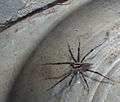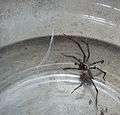Agelenopsis
| American grass spiders | |
|---|---|
 | |
| Agelenopsis cf. pennsylvanica in Vernon, British Columbia | |
 | |
| Agelenopsis pennsylvanica in web, from Pocahontas State Park, Chesterfield, Virginia | |
| Scientific classification | |
| Kingdom: | Animalia |
| Phylum: | Arthropoda |
| Subphylum: | Chelicerata |
| Class: | Arachnida |
| Order: | Araneae |
| Infraorder: | Araneomorphae |
| Family: | Agelenidae |
| Genus: | Agelenopsis Giebel, 1869 |
| Species | |
|
See text. | |
| Diversity | |
| 13 species | |
Agelenopsis is a genus of spiders, known as American grass spiders.[1] They weave sheet webs that have a funnel shelter on one edge. The web is not sticky, but these spiders make up for that shortcoming by running very rapidly. The larger specimens (depending on species) can grow to about 19 mm in body length. They may be recognized by the arrangement of their eight eyes into three rows. The top row has two eyes, the middle row has four eyes, and the bottom row has two eyes (spaced wider than the ones on the top row). They have two prominent hind spinnerets, somewhat indistinct bands on their legs, and two dark bands running down either side of the cephalothorax.
Agelenopsis aperta, the American funnel-web spider, produces agatoxins. Their bite causes rapid paralysis in insect prey, though their venom is not medically significant to humans.
Name
The genus name is a combination of Agelena (Eurasian grass spiders), a genus of similar spiders, and Greek -opsis "to look like". They are harmless spiders. Although most spiders use their webs to catch prey, the grass spider's web lacks adhesive ability. The spiders make up for that with their fast running.
The main distinction between Agelenopsis and the related European genus Agelena consists of the pattern appearing on the cephalothorax; the former possesses two quasiparallel lines from the eyes to the beginning of the abdomen. The latter genus has curved, irregular lines that often meet at the end. Another difference is the length of the front legs row in females, but in males, the comparison is too inconsiderable.
Species
- Agelenopsis actuosa (Gertsch & Ivie, 1936) (USA, Canada) – common American funnel-web spider or Canadian funnel-web spider
- Agelenopsis aleenae Chamberlin & Ivie, 1935 (USA)
- Agelenopsis aperta (Gertsch, 1934) (USA, Mexico) – desert grass spider or North American funnel-web spider
- Agelenopsis emertoni Chamberlin & Ivie, 1935 (USA)
- Agelenopsis kastoni Chamberlin & Ivie, 1941 (USA)
- Agelenopsis longistyla (Banks, 1901) (USA)
- Agelenopsis naevia (Walckenaer, 1842) (USA, Canada)
- Agelenopsis oklahoma (Gertsch, 1936) (USA)
- Agelenopsis oregonensis Chamberlin & Ivie, 1935 (USA)
- Agelenopsis pennsylvanica (C. L. Koch, 1843) (USA) – Pennsylvania grass spider
- Agelenopsis potteri (Blackwall, 1846) (North America, introduced in Russia)
- Agelenopsis spatula Chamberlin & Ivie, 1935 (USA)
- Agelenopsis utahana (Chamberlin & Ivie, 1933) (USA, Canada, Alaska)
Gallery
 Agelenopsis sp. male, 17 mm (about ¾ inch)
Agelenopsis sp. male, 17 mm (about ¾ inch) Same, showing elaborate pedipalps
Same, showing elaborate pedipalps Same, from the side
Same, from the side Agelenopsis sp. showing pronounced leg spines
Agelenopsis sp. showing pronounced leg spines Agelenopsis in its web
Agelenopsis in its web Agelenopsis in web built on grass, with prey
Agelenopsis in web built on grass, with prey A. pennsylvanica female in web
A. pennsylvanica female in web
References
- ↑ Platnick, N. I. (2007). The world spider catalog, version 7.5. American Museum of Natural History.
See also
External links
- Agelenidae species
- Pictures of Agelenopsis sp. (free for noncommercial use)
- Diagnostic Photos and information, Agelenopsis sp.
- Common Spiders in California, Agelenopsis sp.
- Bradley, Richard A. (2012). "Grass Spider" (PDF). Common Spiders of Ohio. Ohio Division of Wildlife. p. 14.